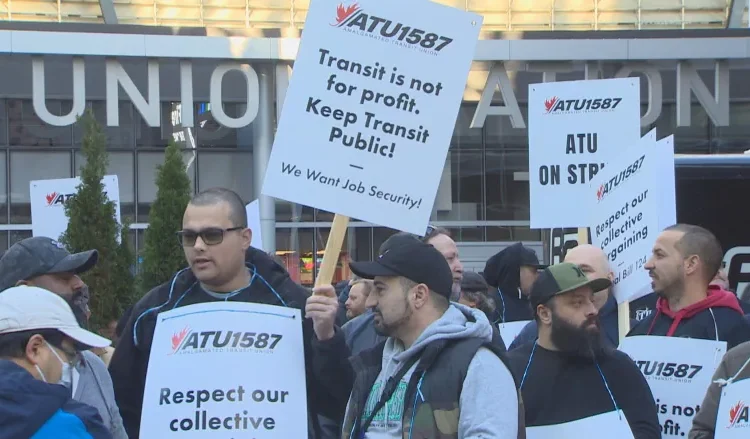Metrolinx urges commuters to plan ahead, prepare for longer trips
Thousands of commuters across much of southern Ontario are scrambling for alternative means of transport after 2,200 GO Transit workers walked off the job Monday.
Workers, including GO bus drivers, station attendants and other employees, took to the picket line outside Toronto’s Union Station on the first day of the strike. They walked out after the Amalgamated Transit Union (ATU) Local 1587 and Metrolinx, the operator of regional transit for Greater Toronto and much of the Golden Horseshoe, failed to reach a deal over the weekend.
Sheila Martin, a GO bus driver of 17 years, said she felt “really sorry” about the disruptions to service, but described the strike as an attempt to ensure the future of quality transit service.
“We just want our voices heard and we don’t want to lose our jobs,” she said.
“We don’t want to be contracted out for cheaper employees.”
The ATU said Metrolinx failed to put forward a proposal Sunday that addressed key bargaining issues, including written commitments to hire more full-time employees and protections against hiring outside contract workers.
“Our number one item since day one has been job protections,” ATU Local 1587 president Rob Cormier said Monday.
The strike will impact hundreds of thousands of passengers who rely on the service, ATU national president John Di Nino says.
“If we can sit at the table and resolve the contract today, we’d be more than happy to get back there, put our members back to work and get the city moving,” said Di Nino.
The strike comes three days after thousands of Ontario education workers represented by the Canadian Union of Public Employees walked off the job Friday before calling off protests set for Tuesday after the Ford government said it would rescind its controversial anti-strike legislation.
The ATU has said negotiations with Metrolinx began in April and members have been working without a contract since June 1. Monday’s strike began after the two sides averted a walkout previously set for Oct. 31 when Metrolinx presented the union with a tentative offer. But 81 per cent of union members voted it down. The ATU says it’s the first time GO Transit bus operators have gone on strike.
The union says it’s willing to return to negotiations if Metrolinx puts forward an improved proposal, but also says it plans to file a complaint with the Ministry of Labour accusing Metrolinx of bad-faith bargaining.
Commuters urged to plan ahead, prepare for longer trips
Anne Marie Aikins, the head of media and public relations for Metrolinx, encouraged customers to plan ahead, budget extra time for commutes and stay informed on strike developments through GO Transit’s website and social media accounts.
Inside Union Station in downtown Toronto, some commuters scanned train schedules on Monday morning after learning bus service was suspended due to the strike.
Abdul Zahad, a 25-year-old Conestoga College student, arrived at the station to take a bus from Toronto to Kitchener, Ont., for a meeting on campus. Instead, he had to opt for a train that was to leave two hours later than his planned departure
“I have to wait here, that’s the only option I have now,” he said. “Since all the buses are cancelled, it’s very hectic.”

Stella Hill, who was on her way from Whitby, Ont., to Guelph, Ont., was also forced to change her travel plans.
While she usually makes the trip via bus, the strike meant using trains instead, adding more than two hours to her trip. Hill, a senior, said she prefers to take the bus for the entire route, in part to avoid long walks between terminals.
“That’s a lot of trouble because it’s a bit of a distance,” she said.
Willing to ‘get back to the table,’ Metrolinx says
Metrolinx issued a statement saying the union walked away from weekend negotiations and declined a request to return to the table on Monday. Cormier confirmed to CBC News that the union left the bargaining table Sunday after giving three offers to Metrolinx.
Aikins said the transit operator has offered more than “67 improvements” to the union’s current collective agreement.
She said Monday Metrolinx had “always bargained in good faith” and remained willing to “get back to the table and to reach an agreement.”
“We were quite surprised that the ATU tabled several new issues, with new language and time ultimatums that could not be reasonably met and then walked away from the negotiations over the weekend,” said Aikins.
Aikins has also acknowledged the union’s concerns about contracting outside workers, but maintained the company has measures in place to ensure safety for all.
“We want to work with ATU and presented a proposal to engage in constructive negotiations and consultation with their membership over the next four weeks,” said Aikins.


